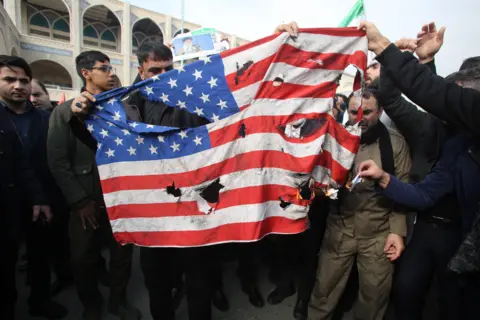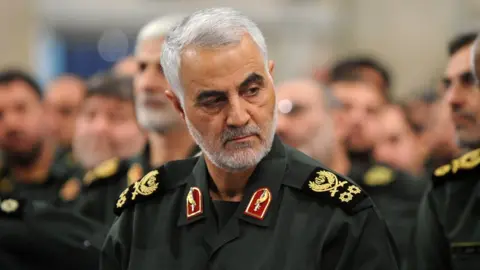US and Iran escalation questions answered: What can the world do?
 AFP
AFPIran has retaliated to the killing of General Qasem Soleimani by attacking air bases housing US forces in Iraq with ballistic missiles.
The United States killed top Iranian military commander Qasem Soleimani in a drone strike in Iraq on Friday.
One of the most powerful figures in Iran, Soleimani spearheaded operations in the Middle East and his killing marks a major escalation in tensions between Washington and Tehran.
Why did US President Donald Trump order Soleimani's death? Will the US be withdrawing troops and US diplomats? What can the rest of the world do? BBC defence and diplomatic correspondent Jonathan Marcus answers readers' questions.

Will the US be withdrawing troops and US diplomats? - Tulia Koroi
The US has already withdrawn some non-essential staff from its embassy in Baghdad but in reality it has actually significantly expanded its military presence in the region, with paratroops, special forces and marines all deployed to Kuwait and elsewhere to be ready should the situation escalate.
In the longer term, President Trump has clearly signalled he wants to reduce America's military footprint in the region.
He pulled some forces out of Syria but then changed his mind and left a smaller presence in the eastern part of the country.
But a lot of the attention now is going to be on the US presence in Iraq.
The Iraqi parliament has voted for US troops to leave but the political chaos in Iraq means any formal decisions to request a US departure could take some time, if it comes at all.
Many analysts believe the US presence there is more tenuous than before this crisis.
How likely is Donald Trump to retaliate with disproportionate aggression as he stated? If not, will he be seen as a coward or a diplomat? - Katrina
We shall see what happens. The signals from Tehran are contradictory - it is not clear if the missile attacks against the two US bases are what Iran thought it could get away with without provoking a devastating US response or just the first instalment of a retaliation over the coming weeks and months.
The scale of this attack - in many ways rather modest compared with the seniority and fame of Soleimani and the passions his death aroused - may give both sides an opportunity to step back from the brink.
If Iran should attack US over the assassination of Soleimani, will the retaliation of the US be seen as an act of self-defence? - Al Bashir
The international legal situation is complex and you will get different answers from different legal experts. But certainly if Iran directly attacked the United States, then the Americans would argue they had a clear and obvious right to self-defence.
What could the rest of the world do to prevent further escalation? - Vignesh Subramanian
After the initial shock at the US action and its potential repercussions there have been widespread calls, even from many of Washington's closest allies, for both sides to scale down the tensions.
The Europeans have invited the Iranian Foreign minister for talks, consultations likely to focus as much on the fate of the moribund nuclear agreement with Tehran as much as the immediate crisis. But it is hard to see Iran foregoing any opportunity to strike back and even harder to imagine President Trump not following through with his threats of a massive counter-strike.
Everything depends upon how events unfold over the coming days and weeks.
How might the UK be affected by these actions? Would the UK be an easier target for retaliation? - Shaun Gaisie
If Iran seeks to broaden its impact by setting the region aflame that could inevitably involve UK forces.
There is a Royal Navy destroyer and frigate in the Gulf along with a supply vessel and mine-hunters. There are some 400 British troops in Iraq as part of the multinational training effort for the Iraqi military.
It is very unlikely that Iran would seek to act against the UK itself, but the country has been behind numerous cyber-attacks and Iran and its proxies are widely believed to have been behind violent attacks and bombings overseas, notably in Latin America.
It is the US that is Iran's focus. It believes that it has suffered a grievous wrong and attacking somebody else - other than US interested - hardly fits the dominant Iranian narrative.
A report in The Times newspaper that Iran had threatened attacks against UK troops has been strongly denied by the Iranian Ambassador in London.
Is it legal to kill someone like this under international law? - Eamonn Donaghy
The US would argue that Soleimani was responsible for unprovoked attacks on American forces in Iraq. Those forces were there at the request of the current Iraqi government.
Soleimani was a man whom Washington believed already had the blood of many US personnel on his hands. Meanwhile the Quds organisation he headed was seen by the US as a terrorist organisation. So his killing may follow a US legal narrative.
But the noted international legal scholar, Notre Dame Law School Prof Mary Ellen O'Connell, has this view of the legal implications:
"Pre-emptive self defence is never a legal justification for assassination. Nothing is. The relevant law is the United Nations Charter, which defines self defence as a right to respond to an actual and significant armed attack," she said.
"The use of a drone to kill Iranian Gen Qasem Soleimani in Baghdad was not in response to an armed attack on the United States. Iran has not attacked the sovereign territory of the United States," she said.
"In this case, the United States has not only committed an extrajudicial killing, it has carried out an unlawful attack within Iraq."
Where does the UN stand on these killings? - Sara
Beyond the stated views of individual representatives, it is hard to say what the UN view is, since there really is no such thing.
Does one, for example, mean the considered view of the UN Security Council? That is likely to be divided and unable to reach consensus.
Secretary General Antonio Guterres said he was deeply concerned by the rise in tensions in the Middle East.
"This is a moment in which leaders must exercise maximum restraint. The world cannot afford another war in the Gulf," his spokesman, Farhan Haq, said in a statement.
Was this ordered to deflect President Trump from the impeachment trial? - Martin Gallagher
It is easy to make these kind of charges but, while domestic political considerations always matter - particularly during an election year for President Trump - this decision would be a product of two factors: opportunity and circumstance.
The context seems to be the escalating attacks on US facilities in Iraq, along with vague assertions by the Pentagon about future attacks in the making.
And the opportunity presented itself - a further demonstration of the accuracy and reach of US intelligence - which, while far from infallible, is a factor that the Iranians will need to contend with in deciding upon any response.
In an election year, President Trump's main concern is to avoid the loss of US lives in the region.
This dramatic strike seems in some way out of character for a president who, while talking tough, has been characterised by remarkable caution in terms of actions.
Is there any danger of Iran pursuing a nuclear response? Does it have a nuclear capability? - Harry Rickman
No. Iran does not have a nuclear weapons programme as such, though it retains many of elements that could contribute to such a programme and the know-how to proceed with one.
 Getty Images
Getty ImagesIran has always insisted that it does not want the bomb. But could growing frustration with Washington persuade Iran to throw off all constraints and essentially abandon its nuclear agreement with the international community altogether? That is a possibility.
The Trump administration has already abandoned the so-called JCPOA agreement or Iran nuclear deal - many analysts might say recklessly - raising the pressure on Tehran but without any clear diplomatic "off ramp" to contain the tension.
What was Gen Soleimani doing in Iraq? What does the Iraqi government say about this? - Tom
It's not clear what precisely the general's business was in Iraq. But Iran supports a variety of influential Shia militia groups there and the man who was killed alongside him, Abu Mahdi al-Muhandis - was the leader of Kataib Hezbollah (the group said to be responsible for recent rocket attacks on US bases) and the deputy commander of a coalition of pro-Iranian militias in Iraq.
The Iraqi government has been put in a very difficult position, especially since the attack came on its soil. It is an ally both of Iran and of the US, and US troops remain in Iraq to assist in the broader struggle against the Islamic State (IS) group.
The Iraqi authorities were already embarrassed by the militia attacks against bases housing US facilities. The Iraqi government both condemned recent US reprisals against this militia group while insisting to the Americans that they would do more to protect the bases.
The Iraqi prime minister's office condemned the killing of Soleimani, and described him and the militia leader killed alongside him as "martyrs" behind the "great victories against IS". The Iraqi government also insists that the US acted way beyond the terms of the agreements under which it operates in the country.
What is the role of the US and Iran in Iraq? - Kakinga Moses
Iran is a close ally of the Shia-led government in Iraq. It is also a significant player in the country in its own right, working through the militia groups mentioned above. The US has some 5,000 troops in Iraq, training and mentoring the Iraqi military in its effort to defeat remaining IS elements.
Essentially these two outside players - the US and Iran - have been manoeuvring against each other in Iraq.
One big question now is will a moment of crisis come that makes a continued US presence in the country untenable?


Do you have any questions about the assassination, why it happened or what happens next? What do you want to know about the relationship between Iran, Iraq and the US?
In some cases your question will be published, displaying your name, age and location as you provide it, unless you state otherwise. Your contact details will never be published. Please ensure you have read the terms and conditions.
Use this form to ask your question:
If you are reading this page and can't see the form you will need to visit the mobile version of the BBC website to submit your question or send them via email to YourQuestions@bbc.co.uk. Please include your name, age and location with any question you send in.
